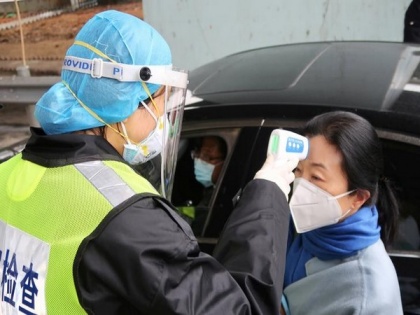Why is China silent over disappearances of Covid-19 whistleblowers?
By ANI | Published: April 20, 2020 02:08 PM2020-04-20T14:08:28+5:302020-04-20T14:20:09+5:30
Human rights advocates fear that the Chinese authorities have been secretly terrorising lawyers and activists speaking up about the coronavirus outbreak and are being branded as enemies of the state in the process.

Why is China silent over disappearances of Covid-19 whistleblowers?
Based on an investigation in the matter, The Daily Mail on Sunday uncovered a "cynical and orchestrated" campaign by the Chinese regime to stop the country's 1.4 billion citizens from even discussing the appalling COVID-19 outbreak among themselves.
More than 5,100 people were arrested for sharing information in the first weeks of the outbreak, dissidents are being labelled as sick so the government can place them in medical quarantine, also health apps used by some millions of people to show they are clear of coronavirus are being used to monitor people's movements and further tighten control, the Mail stated citing the investigation.
The unprecedented crackdown began with reprimands issued to Dr Li Wenliang, 34, and seven other doctors for sending messages to fellow medics on December 30, warning them about the outbreak of a SARS-like illness in Wuhan Central Hospital and advising them to wear protective clothing.
Dr Li was forced to sign a police document saying he had 'seriously disrupted social order' and breached the law before he returned to work at Wuhan Central Hospital where he died of COVID-19 on February 7.
In the wake of it, the mainland's Communist leaders were shaken by a nationwide outcry which saw the hashtag #wewantfreedomofspeech shared two million times in the space of hours. But they had already embarked on a ruthless tightening of a vice-like grip on social media with the first of a string of high-profile disappearances.
A day before Dr Li's death, lawyer Chen Qiushi - whose videos of chaotic scenes in Wuhan hospitals with coronavirus victims lying in corridors were shared with an audience of more than 400,000 YouTube and 250,000 Twitter followers - went missing. His family was told the following day that he was being held in medical quarantine at an undisclosed location.
However, as soon as Chen realized that police were closing in on him just before his disappearance, he told his followers ominously: "As long as I am alive, I will speak about what I have seen and what I have heard. I am not afraid of dying. Why should I be afraid of you, Communist Party?" And he vshed days later.
Three weeks later, Li Zehua, 25 - a reporter with Chinese state TV who went rogue to report on the death toll in Wuhan - live-streamed his own arrest when plain-clothes police officers at his flat. Li became the third case of China's crackdown on whistleblowers.
Earlier that day Li, who filmed a series of videos showing desperate communities running low on food in virus-riddled areas of Wuhan, and gave his viewers a running commentary on how he was chased by police after visiting the Wuhan Institute of Virology, where it has been speculated the outbreak may have been started by a lab leak.
"I'm sure they want to hold me in isolation," he said in a pcked video clip as he sped away from the institute by car. "Please help me," became his last words.
The Chinese government has been silent over the fate of the whistle-blowers but all three are believed to be in secret detention centres - a sinister form of extrajudicial imprisonment described by officials as 'residential surveillance at a designated location'.
Frances Eve, deputy director of research at Hong Kong-based watchdog Chinese Human Rights Defenders (CHRD), said: "Everyone who has disappeared is at very high risk of torture - most likely to try to force them to confess that their activities were criminal or harmful to society."
"Then, as we've seen in previous cases, people who have been disappeared will be brought out and forced to confess on Chinese state television," he told the Mail.
The secret detention centres usually hold dissidents such as human rights activists and lawyers, said Eve, adding, "In most cases we've tracked, people who go in have been tortured. You don't have access to your lawyer or your family or anyone outside the police."
China has time and again denied knowledge of the disappearance of the whistle-blowers. The Chinese ambassador to the US, Cui Tiankai, has been asked twice on televised interviews about the fate of Chen Qiushi. But the envoy has insisted: "I have not heard of this person... I did not know him then, and I do not know him now."
The only disappeared person China has made any official comment on is billionaire property tycoon Ren Zhiqiang, 69, who vshed in March after calling President Xi Jinping a clown for mishandling the virus outbreak.
The state police publicly announced on February 21 they had intervened and penalised people in 5,111 cases of 'fabricating and deliberately disseminating false and harmful information' in the first weeks of the crisis alone.
The reason for the crackdown was that China's leaders viewed the outbreak as an existential threat and used the disappearance of high-profile critics as a way to terrify people into obedience, Eve argued.
She added: "There's a Chinese phrase that you kill the chicken to scare the monkey. The arrest of the eight doctors, including Dr Li, at the beginning of January, was a signal to people to be silent about the coronavirus."
( With inputs from ANI )
Open in app